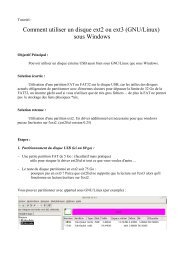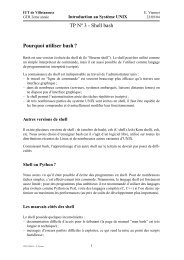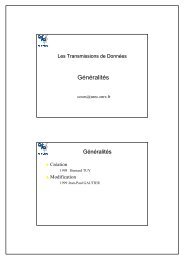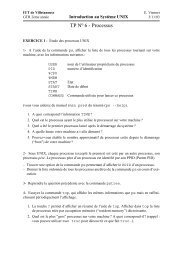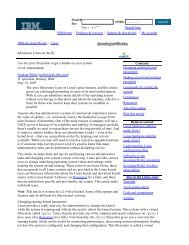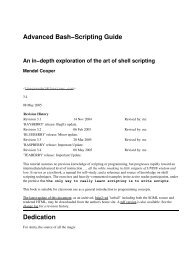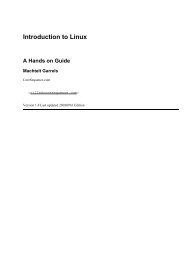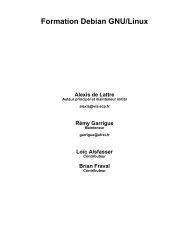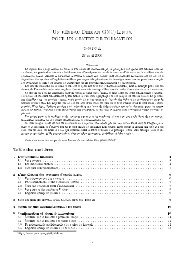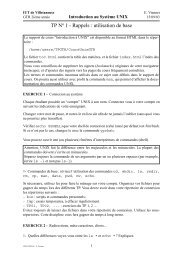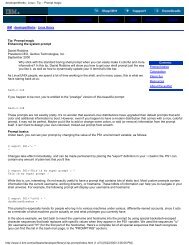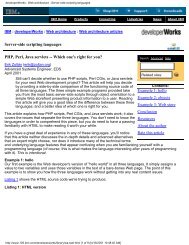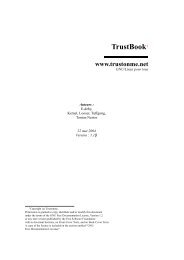Tcl/Tk quick start - Free
Tcl/Tk quick start - Free
Tcl/Tk quick start - Free
Create successful ePaper yourself
Turn your PDF publications into a flip-book with our unique Google optimized e-Paper software.
Presented by developerWorks, your source for great tutorials<br />
ibm.com/developerWorks<br />
expect "Name*:"<br />
send "anonymous\r"<br />
expect "Password:"<br />
send "bilbrey@orbdesigns.com\r"<br />
expect "ftp>"<br />
send "binary\r"<br />
expect "ftp>"<br />
send "cd inet/rfc\r"<br />
expect "550*ftp>" exit "250*ftp>"<br />
send "get $file\r"<br />
expect "550*ftp>" exit "200*226*ftp>"<br />
close<br />
wait<br />
send_user "\nuncompressing file - wait...\n"<br />
exec uncompress $file<br />
This program automates FTP retrieval of IETF RFC (Request For Comment) documents from<br />
the UUNet archive. The first line of the script invokes an Expect shell. Note that I've given the<br />
full pathname to the executable. That's safest, since it's hard to know the path environment<br />
of any given user. The script first checks for the Expect version, then prints a usage message<br />
unless the correct number of arguments is given.<br />
Next, a timeout value is set to prevent the Expect script from locking up system resources if<br />
the FTP session spawned on the following line fails to connect properly. Most of the balance<br />
of the script are sets of expect / send command pairs. Each expect command waits for the<br />
specified output from the spawned program (ftp, in this case), and then sends the correct<br />
response. Note that there are two traps for ftp error codes following the cd and get<br />
instructions. In each case, the error code 550 is matched against first, and if true, then the<br />
script exits. Otherwise, following a 250 code (indicating success), expect drops through into<br />
the next command.<br />
After the document is received, the script issues a close command to the ftp session. The<br />
wait command holds up script processing until ftp is terminated. Finally the script sends a<br />
message to the user, decompresses the downloaded RFC (or rfc-index), then exits by<br />
default, not explicitly.<br />
The keys to Expect, Part 1<br />
There are four key commands in Expect (the language, with an uppercase 'E'). First is expect<br />
(the command, little 'e'), which searches for patterns and executes commands if a match is<br />
made. For each expect command, there can be several groups, each composed of option<br />
flags, a pattern to match against, and a command or body of commands to execute. expect<br />
"listens" to SDTOUT and STDERR by default, until a match is made or the timeout expires.<br />
#!../expect -f<br />
# wrapper to make passwd(1) be non-interactive<br />
# username is passed as 1st arg, passwd as 2nd<br />
set password [lindex $argv 1]<br />
spawn passwd [lindex $argv 0]<br />
expect "password:"<br />
send "$password\r"<br />
expect "password:"<br />
send "$password\r"<br />
expect eof<br />
<strong>Tcl</strong>/<strong>Tk</strong> <strong>quick</strong> <strong>start</strong> Page 22 of 29



